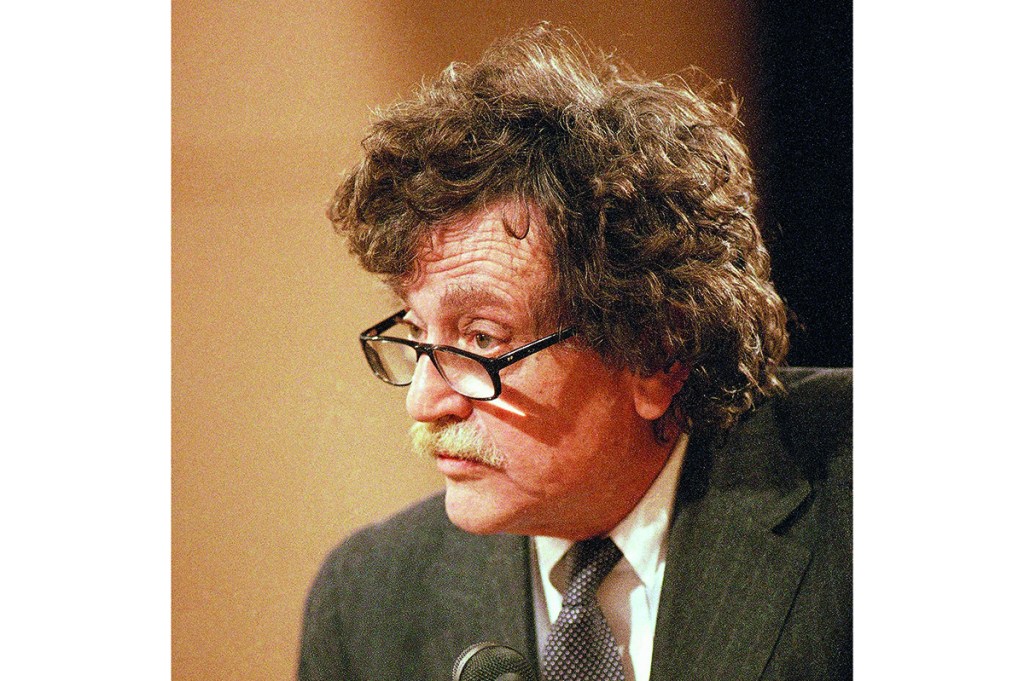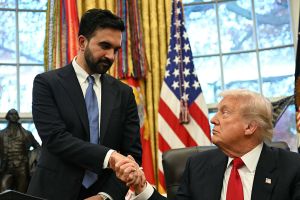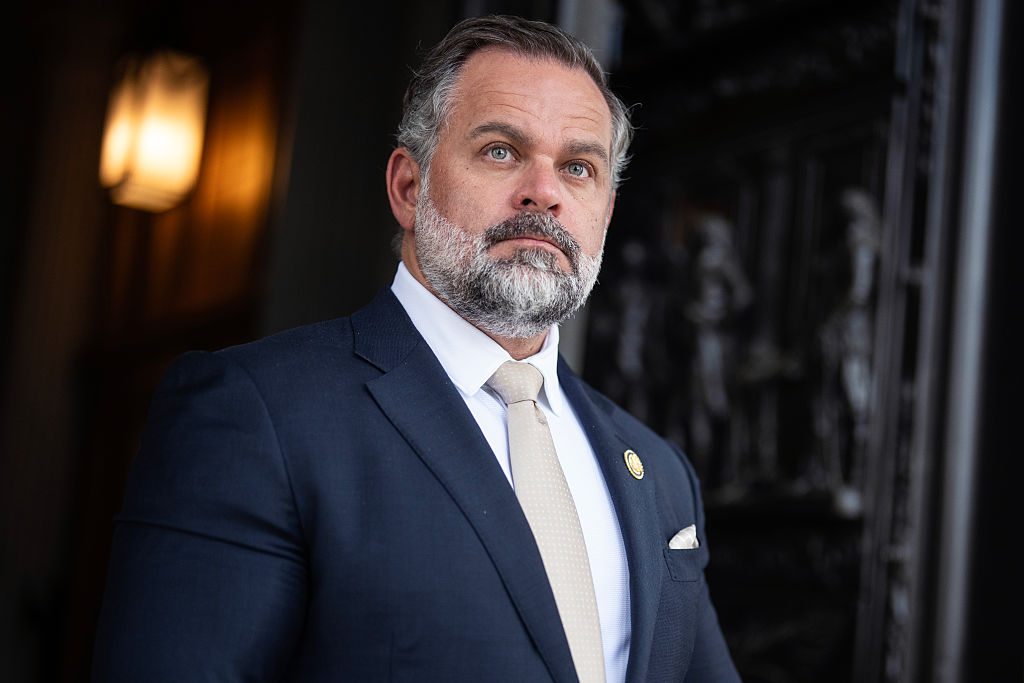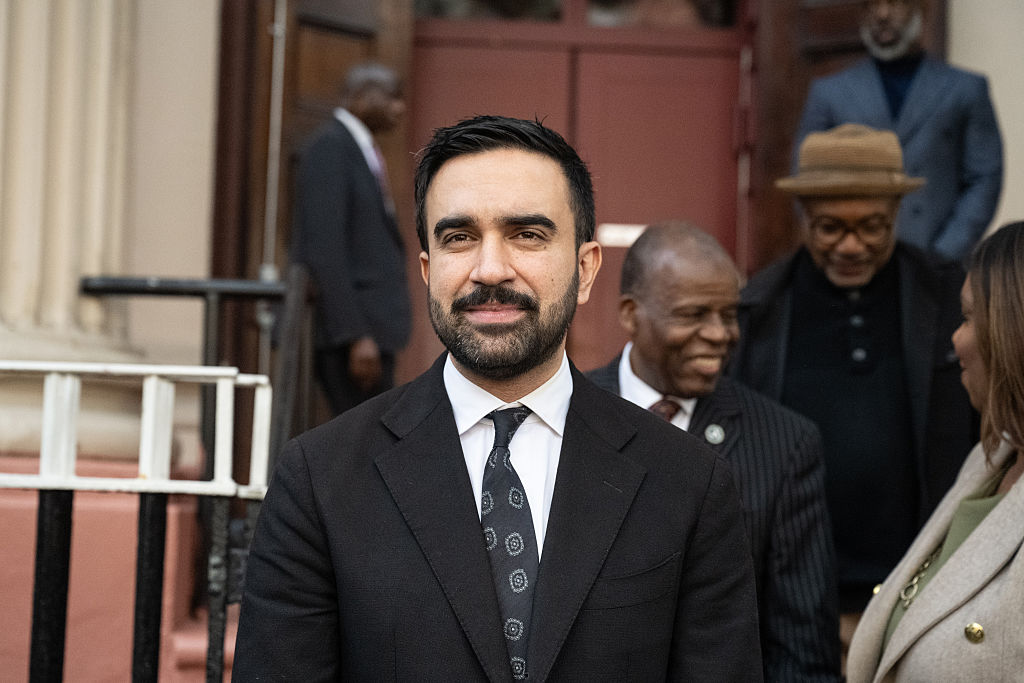Kids who read Kurt Vonnegut in high school are often the kind of people who have trouble being earnest about anything. These arch-ironist teens sneer at the narrow-mindedness of their families and hometowns and place basketball pep rallies on the same continuum of fascist conformity as the Iraq War. They aren’t what you’d call ‘joiners.’
I should know. My own teenage reading habits tended toward edgy counterculture (including plenty of Vonnegut), and I half admired the kids at my white-bread Presbyterian high school who smoked cigarettes and experimented with Buddhism. Only my ingrained sense of Lutheran guilt and my distaste for excessive cynicism prevented me from truly becoming one of them. The conflicting desires to fit in and stand out, earnestness contra irony, form a paradox found in every society. But irony, apparently by necessity, generally opposes religion and tradition, and its triumph would seem to mean their downfall and the downfall of society itself.
During a presentation on mental health at my alma mater, Grove City College, the speaker quoted Vonnegut: ‘The most daring thing is to create stable communities in which the terrible disease of loneliness can be cured.’ I suspected at the time that she had simply googled ‘quotes about loneliness’ and had no idea who Kurt Vonnegut was. Otherwise, I simply couldn’t reconcile the earnest religious piety and political conservatism that defined Grove City with the words of a godless, obscene, postmodern satirist.
Vonnegut did plenty to offend the conservative Christian sensibilities that characterized my educational institutions, including being among the first to use the word ‘motherfucker’ in print. For one thing, he described himself as a ‘Christ-loving atheist,’ quoting the Sermon on the Mount fondly and frequently while satirizing organized religion. The Sermon does contain admirable sentiments, but they’re hard for any honest thinker to reconcile with its Author’s apparent megalomania, from which He never backed down and for which He was killed (not for any of His moral teachings). Jesus can be Mr Rogers or David Koresh, but He can’t be both.
Vonnegut insisted, however, that he was no enemy of organized religion. Although he succeeded Isaac Asimov as Honorary President of the atheistic American Humanist Society, he admitted that secular humanism appeals almost exclusively to ‘educated, comfortably middle-class persons.’ He even encouraged one correspondent, who had written to Vonnegut asking what he should do when he got out of prison, to find community by joining a church. It was exactly this communitarian aspect of Christianity that, in Vonnegut’s view, enabled the upstart faith to supplant the mass state-worship of Roman paganism. Vonnegut’s Christology may be heterodox, but his claim that true Christians distinguish themselves primarily by how they love one another is soundly scriptural.
Vonnegut also stumbled into the naivest kind of apologia for socialism. In his 1997 novel-cum-memoir Timequake, he proposes two amendments to the US Constitution:
‘Article XXVIII: Every newborn shall be…cared for until maturity. Article XXIX: Every adult who needs it shall be given meaningful work to do, at a living wage.’
Noble goals, certainly, but Vonnegut seems blind to the dangers of placing such power in the hands of the state. He even dismisses concerns about Soviet totalitarianism with a classic ‘not real socialism’ argument:
‘I of course understand that the widespread revulsion inspired even now, and perhaps forever, by the word Communism is a sane response to the cruelties and stupidities of the USSR, who called themselves, hey presto,Communists, just as Hitler called himself, hey presto, a Christian.’
The analogy doesn’t quite work. Despite Vonnegut’s attempt to present authoritarianism as a bug in the socialist program, history tends to vindicate Solzhenitsyn’s presentation of it as a feature.
And yet Vonnegut is undeniably correct in identifying capitalism’s failure to provide care and meaning to all and its tendency to substitute unsatisfactory alternatives. The last thing he would want is the nightmarish convergence of capitalism and socialism envisioned by the anarchist Peter Kropotkin, a world in which it’s ‘every one for himself and the State for all’. Capitalism is excellent at creating wealth, but if we’re going to survive it (and preserve it), then it’s up to us to fight like hell against its tendency to uproot and atomize us.
Toward the end of Timequake, Vonnegut proposes another amendment:
‘Article XXXI: Every effort shall be made to make every person feel that he or she will be sorely missed when he or she is gone.’
Here, Vonnegut’s tongue is moving cheekward. No government can guarantee such things by fiat, as Vonnegut himself acknowledges in his next sentence: ‘Such essential elements in an ideal diet for a human spirit, of course, can be provided convincingly only by extended families.’ Drawing on his studies in anthropology, Vonnegut observes that such families protect children from their parents’ neuroses and ease the burdens of parenthood. He’s certainly onto something. Many young parents, having moved to job rich cities far from their families, now find themselves caught in a catch-22: either go broke so one parent can stay home, or blow most of a salary on childcare so strangers can raise their kid. State-subsidized daycare would help solve this dilemma, but so would living two blocks from Grandma and Grandpa. If that isn’t an option, we’ll need to find new ‘relatives’ or learn to love Big Brother.
At the very least, Vonnegut is saying that family and other forms of organic community are necessary if government solutions are to take root and flourish without becoming invasive weeds that deplete the soil. John Adams and Alexis de Tocqueville would agree. I wondered, though, about the inherent tension in Vonnegut’s thought. If push came to shove, would he choose an impersonal socialism or a humanistic anarchism defined by voluntary mutual aid?
In Slapstick, Vonnegut provides the answer. Published in 1976, midway through the decade in which the precipitous decline of the nuclear family began, Slapstick is the autobiography of Dr Wilbur Daffodil-11 Swain, the last president of the United States. Swain campaigns on the slogan ‘Lonesome No More!’ and, once in office, implements a massive federal program to restore community by giving every American ‘ten thousand brothers and sisters’ and ‘one-hundred and ninety-thousand cousins.’ He accomplishes this by issuing everyone, in a rollout reminiscent of FDR’s Social Security numbers, ‘a new middle name’ consisting ‘of a noun…connected by a hyphen to a number between one and twenty.’ Everyone with the same noun and number becomes a sibling, and everyone with the same noun becomes a cousin. If a beggar from outside your new family approached you for help, you could remind him that he’s ‘not exactly alone in this world’ and invite him to go ‘take a flying fuck at the moon.’
This program proves to be the last gasp of the federal government. Soon afterward, the United States collapses and the new artificial families — what David Brooks calls ‘forged families’ and presents as our only hope for the future — are left to fend for themselves and for each other. And they do.
I shouldn’t have been surprised. Vonnegut wouldn’t have the patience to put up with all the bureaucratic nonsense inherent in socialism. It’s no accident that in Back in the USSA, an alternate history of a Cold War between the United Socialist States of America and a liberalized Russia, Vonnegut stands in for Mikhail Gorbachev, introducing American equivalents of glasnost and perestroika: ‘Talking Straight’ and ‘Getting it Together.’ Every true satirist is a sworn enemy of bigness.
It is true that in Slapstick the state gets the ball rolling, but as Robert D. Putnam argues in Bowling Alone, ‘Many of the most creative investments in social capital in American history — from county agents and the 4-H to community colleges and the March of Dimes — were the direct result of government policy.’ Government can work to facilitate the growth of community, but the goal of these programs should be to create communities that can survive and thrive without continual government intervention. Perhaps these forged communities can even partially displace or entirely outlast the government that created them.
Dr Swain ends his autobiography by describing the cross-country journey his pregnant granddaughter undertook to join him in the ruins of Manhattan and the care she received along the way:
‘She would encounter relatives everywhere — if not Orioles, then at least birds or living things of some kind.
They would feed her and point the way. One would give her a raincoat. Another would give her a sweater and a magnetic compass.
‘Another would give her a baby carriage…
‘And so on.’
Vonnegut the atheist may deny the divinity of Christ. Vonnegut the socialist may whitewash the bloody history of Marxism. Vonnegut the satirist may offend delicate sensibilities and topple sacred cows. But Vonnegut the traditionalist prefers mutual aid over government handouts, favors multi generational families over the mobile nuclear capitalist model, and would rather a see man in church on Sunday morning than in front of his TV.
He worked toward a utopia, but not the atheist utopia that will arrive only when Enlightenment secularism drops a Hellfire missile on the last imam or the socialist utopia in which the omnicompetent state replaces the family. ‘People will be happier,’ he wrote, ‘not when they cure cancer or get to Mars or eliminate racial prejudice or flush Lake Erie but when they find ways to inhabit primitive communities again. That’s my utopia.’ And he could think of no better real world example of it than the forged family of the Early Church.
This article was originally published in The Spectator’s January 2021 US edition.

























